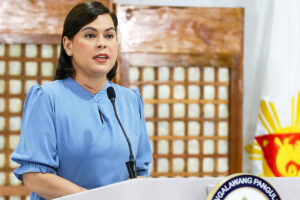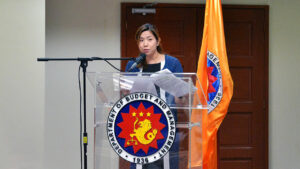By Kyle Aristophere T. Atienza, Reporter
VICE-PRESIDENT Sara Duterte-Carpio on Wednesday resigned from the Cabinet of President Ferdinand R. Marcos, Jr., according to the presidential palace, ending two years of political partnership with the Marcoses.
She would no longer serve as Education secretary and as vice chairperson of the government’s anti-communist task force effective July 19, Presidential Communications Office Secretary Cheloy Velicaria-Garafil said in a statement.
She did not say why she resigned, Ms. Garafil said, adding that the President had accepted her decision. “We thank her for her service.”
Mr. Marcos and Ms. Duterte-Carpio ran in tandem in the 2022 elections and won.
In the Philippines, the president and vice-president are elected separately and may come from opposing political parties. The Vice-President usually becomes powerless unless the President gives him a key post in his Cabinet.
In a speech shortly after the palace announcement, Ms. Duterte-Carpio said she met with the President earlier in the day to file her resignation. She added that she gave him a 30-day notice to ensure an orderly transition.
“My resignation is not a sign of weakness but was brought by genuine concern for our teachers and the Filipino youth,” she said in Filipino. “We will continue to promote the quality of education that Filipinos deserve.”
Mr. Marcos and Ms. Duterte-Carpio campaigned on a platform of unity and reconciliation.
“UniTeam as a team was formed out of convenience,” Jan Robert R. Go, a political science professor at the University of the Philippines, said in a Facebook Messenger chat. “The resignation is only indicative of the fragile coalition that they had. That’s the final nail in the UniTeam’s coffin.”
Cracks within the ruling coalition became more apparent after the House of Representatives last year denied Ms. Duterte-Carpio’s request for confidential funds under the 2024 national budget.
Ms. Duterte-Carpio, who was appointed vice-chairperson of the anti-communist task force in May last year, was among the first to hit the government’s attempt to pursue peace talks with Maoist rebels, calling it “an agreement with the devil.”
The International Criminal Court (ICC) is investigating her father and Mr. Marcos’ predecessor Rodrigo R. Duterte for his deadly war on drugs.
Mr. Marcos had said his government was studying the possibility of rejoining the ICC after an exit in 2019, although he has opposed the ICC probe, which he sees as an affront to Philippine sovereignty.
Mr. Marcos has veered away from, if not totally reversed, some of Mr. Duterte’s key policies, including pursuing closer security ties with the United States away from China.
Mr. Duterte in January accused Mr. Marcos of being a drug addict, a claim that Mr. Marcos attributed to Mr. Duterte’s fentanyl use.
Maria Ela L. Atienza, who teaches political science at UP, said Ms. Duterte’s resignation from the Marcos Cabinet was “long overdue.”
“Finally, the façade or formality of unity is [gone] and both camps can freely attack each other,” she said in a Viber message. “After all, Philippine politics is dominated by political dynasties and factions supporting them and not political parties.”
Ms. Duterte-Carpio left the Department of Education (DepEd) in a poor state, with groups criticizing the agency’s poor performance in handling the education crisis brought by lockdowns under a coronavirus pandemic.
The Philippines ranked 77th among 81 countries in the 2022 Programme for International Student Assessment (PISA), with Filipino students aged 15 lagging in math, reading and science.
In a recent report on PISA 2022, the Organization for Economic Cooperation and Development on Tuesday said 15-year-old Filipino students ranked 63rd out of 64 countries in terms of creative thinking.
Hansley A. Juliano, who teaches political science at the Ateneo de Manila University, said in a Facebook Messenger chat that Ms. Duterte-Carpio might be “running away” from the potential consequences of her DepEd leadership.
“Ms. Duterte tried to cling to her position, knowing how instrumental DepEd is for political control as well as for her future political plans,” said Arjan P. Aguirre, a political science professor at the Ateneo.
“Expect her to be more aggressive for the midterm elections,” he said via Messenger chat.
The political parties of Mr. Marcos and his cousin Speaker Ferdinand Martin G. Romualdez have built a coalition with two other parties ahead of the 2025 midterm elections for a full Senate slate.
Ms. Duterte-Carpio’s regional party, Hugpong ng Pagbabago, is not part of the new coalition, although Mr. Romualdez has said their group was open to an alliance with the Mindanao-based group.
“As the midterm elections come closer, Sara is probably consolidating her position and support to build up for her possible presidential bid,” Mr. Go said.
He said Mr. Marcos now has “greater leeway” to act without considering the sensibilities of the Dutertes “and even directly confront them when necessary.” “In the end, the losers are the people who are mere spectators of this political elite’s bickering.”





